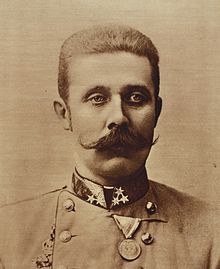Home Before the Leaves Fall from the Trees
Empty Promises and Germany in the First World War

Empty Promises and Germany in the First World War

Welcome, one and all, to Home Before the Leaves Fall from the Trees!
This AAR shall be a narrative, following members of the German High Command and the Kaiser's government throughout the First World War from the July Crisis all the way to the end. Intermittently, we may have some surprise guests as well.
I intend to play as realistically as possible and will play on normal difficulty; I will also try to avoid "gamey" tactics and decisions.
My skill at writing narrative is definitely not the best, so please bear with me if it's slow, poorly written, etc. Constructive criticism to improve my writing style is also welcome.
Anyway, strap yourselves in, as we're going to follow the Reich on her journey through the War to End All Wars, which may or may not end with it being completely removed from the face of the planet.
Deutschland Uber Alles!
Dramatis Personae (in order of appearance)
Members of Government
Count Gottlieb von Jagow - German Minister of Foreign Affairs
Walter Nicolai - German Head of Military Intelligence
Crown Prince Wilhelm - German Royal Heir
Clemens von Delbrück - German Vice-Chancellor and Minister of the Interior
Wilhelm II - Emperor of the German Empire
Count Heinrich Leopold von Tschirschky - German Ambassador to Austria-Hungary
Members of the Military
Hans von Albrecht - German Colonel of the Guards Corps
Contents
Chapter I - A Warning
Part I. 23 June 1914 - Foreign Office, Berlin (Gottlieb von Jagow)
Part II. 23 June 1914 - Office of Military Intelligence, Berlin (Walter Nicolai)
Part III. 24 June 1914 - Kronprinzenpalais, Berlin (Crown Prince Wilhelm)
Part IV. 26 June 1914 - Stadtschloss, Berlin (Clemens von Delbrück)
Part V. 27 June 1914 - Office of Military Intelligence, Berlin (Walter Nicolai)
Course of Events
Chapter I
On July 23, 1914, an anonymous letter is received by the Office of Military Intelligence stating that a member of the royal families of Germany, Austria-Hungary, or Italy is going to be threatened in the coming days. In a quick frenzy, the upper echelons of the German government go into turmoil, and both Wilhelm II and Gottlieb von Jagow, Minister of Foreign Affairs, are quickly alerted of the situation. Walter Nicolai, the Chief of Military Intelligence, informs Crown Prince Wilhelm that his life is potentially at risk, and at the same time the governments in Vienna and Rome are informed of the threats. By orders of the Kaiser, the Crown Prince is confined to his palace, forbidden to leave his room, until the Kaiser himself could give a speech concerning the rumors regarding the threats that had quickly spread throughout Berlin and threatened to break out into the rest of Germany. Vice-Chancellor Clemens von Delbrück, however, persuades Wilhelm from giving such a speech, thereby potentially saving his life and avoiding a total disaster for Germany. On June 27, Walter Nicolai discovers from the Ambassador to Vienna, Heinrich von Tschirschky, that the Austrian heir Franz Ferdinand has proceeded with his trip to Sarajevo, which Walter correctly identifies as a possible time for assassination.Members of Government
Count Gottlieb von Jagow - German Minister of Foreign Affairs
Walter Nicolai - German Head of Military Intelligence
Crown Prince Wilhelm - German Royal Heir
Clemens von Delbrück - German Vice-Chancellor and Minister of the Interior
Wilhelm II - Emperor of the German Empire
Count Heinrich Leopold von Tschirschky - German Ambassador to Austria-Hungary
Members of the Military
Hans von Albrecht - German Colonel of the Guards Corps
Contents
Chapter I - A Warning
Part I. 23 June 1914 - Foreign Office, Berlin (Gottlieb von Jagow)
Part II. 23 June 1914 - Office of Military Intelligence, Berlin (Walter Nicolai)
Part III. 24 June 1914 - Kronprinzenpalais, Berlin (Crown Prince Wilhelm)
Part IV. 26 June 1914 - Stadtschloss, Berlin (Clemens von Delbrück)
Part V. 27 June 1914 - Office of Military Intelligence, Berlin (Walter Nicolai)
Course of Events
Chapter I
Last edited:







